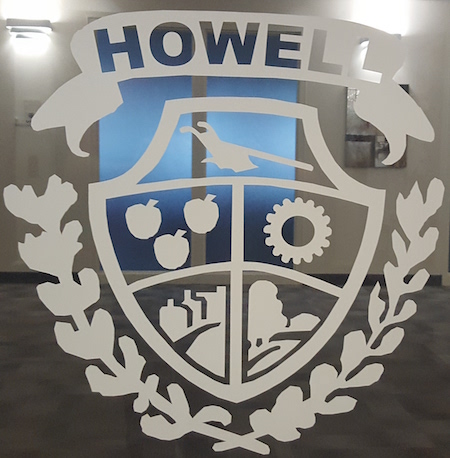HOWELL – The members of the Howell Township Council have adopted an ordinance that defines fulfillment warehouse/centers, warehousing and distribution.
The issue has been on the front burner in recent years as the Planning Board and the Zoning Board of Adjustment continue to consider development applications for those types of uses in the community.
Mayor Theresa Berger, Deputy Mayor Pamela Richmond, Councilman John Bonevich and Councilwoman Evelyn O’Donnell voted “yes” on a motion to adopt the ordinance during the March 15 council meeting. Councilwoman Suzanne Brennan was absent.
The ordinance defines fulfillment warehouse/centers as “those facilities involved in receipt of bulk products and the storage, separation and distribution of those products on an individual basis to individual end-user consumers (not retail). This use includes e-commerce activities.”
According to the ordinance, warehousing will mean facilities involved in short-term to long-term storage of bulk materials and products. Items are brought in and distributed in bulk with little to no material repackaging, repurposing or breakup. Warehousing will not include fulfillment warehouse/centers.
Distribution will mean facilities engaged in the receipt, storage and distribution of goods, products, cargo and materials, including trans-shipment by boat, rail, air or motor vehicle. Distribution will not include fulfillment warehouse/centers, according to the ordinance.
During a public hearing that preceded the council’s vote to adopt the ordinance, resident Joan Osborne asked why the legislation was needed.
Matthew Howard, who was Howell’s zoning officer and director of land use and development and is now the township’s director of community development, responded, saying, “So right now changing the definition as the zoning officer, it gives me something when somebody proposes a use, whether it is to a board, and I review it for jurisdiction depending on what type of variances (the proposed facility) needs.”
Howard said the having the definitions the ordinance provides will allow him “to pinpoint what the use is.”
“Two of the definitions, warehouse and distribution, are permitted in certain zones in town, one of them, the fulfillment center, is not. So if somebody comes to me with a statement of use that sounds like a fulfillment center they will not be able to get a permit. They will not be going to the Planning Board for site plan approval. They would need zoning board approval for a use variance,” Howard said.
He explained how the ordinance could impact the future.
“We have a master plan element under construction right now, it is almost complete. We will be going public to the Planning Board with that document very soon. We will be doing presentations so, yes, there are additional changes coming; this is a preliminary one,” Howard said.
Osborne said one issue that came up on a regular basis when she served on the Howell Environmental Commission was “who are the intended tenants?” of a specific facility.
“They may come into the Planning Board saying they want to build a warehouse and they are not going to call it a fulfillment center, but we don’t really know what they intend to do until they get the tenants, and meanwhile if their intent was to do the fulfillment center type work and you don’t issue them a permit that’s after the fact of the building,” Osborne said.
Bonevich asked if there have been any applications for fulfillment centers before the Planning Board or the Zoning Board of Adjustment as of March 15.
“The big warehouses that are coming in are not fulfillment centers. Nobody has come in and said they are e-commerce, or a fulfillment center, or a last-mile facility,” Howard said.
Township Attorney Joseph Clark said municipal officials are looking at the “appropriateness of various zones” and the “appropriateness of various uses.”
“Nothing is off the table and it is all going to be addressed starting very shortly once the land use element (of the master plan) … gets in front of the master plan subcommittee,” Clark said.
Resident Marc Parisi asked officials why they would define a fulfillment center in the ordinance if fulfillment centers are already not permitted.
“Could we find ourselves in litigation (if an applicant) wants to build a fulfillment center, and you define it, but you don’t have any zones that allow it? Why are you defining it if you are not allowing it?” Parisi asked.
“Defining something does not put any onus on having to put it somewhere,” Howard said. “You can have a definition for this exact purpose, to separate it out from other similar definitions. It is only a definition for clarity’s sake.
“We have a lot of definitions in (the law), a variety of things and not all of them are specific uses that are in our tables, for that exact purpose, for the zoning officer. I love clarity, I like black and white, I don’t like gray, it helps me, but there is no onus to have to zone it,” he said.
Clark said the general principle in zoning is “if it’s not permitted, it’s prohibited” and added, “So we are not permitting it, it is prohibited, I’ll litigate it.”

